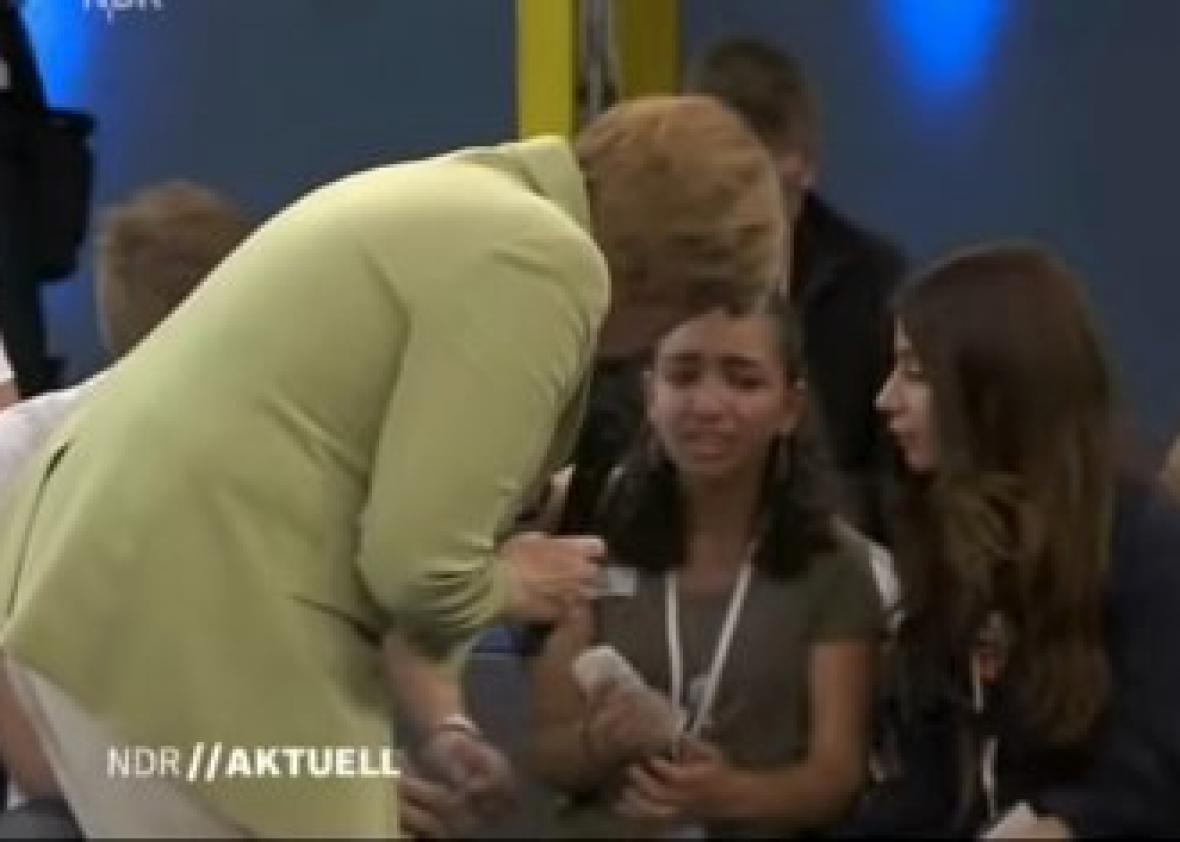Merkel Tells Sobbing Teenager Why Her Family Can’t Stay in Germany

German Chancellor Angela Merkel had a dramatic confrontation with the effects of her government’s immigration policies today when she comforted a sobbing teenage asylum seeker after telling her why her family can’t remain in Germany.
During a televised conversation with high school students in Rostock—a conversation that had the in-retrospect-unfortunate title “The Good Life in Germany”—Merkel was asked a question by a Palestinian teenager named Reem. The teen told the chancellor that she had been studying in Germany for four years since her family arrived there from a refugee camp in Lebanon, but that she would soon be deported as her father’s work visa was about to expire. “It's really difficult to see that others are really able to enjoy their lives and you yourself can't enjoy it with them,” Reem said.
A visibly flustered Merkel replied that while Reem is “an extremely nice person,” she had to understand that “politics is sometimes hard.” She continued: “You know, in the Palestinian refugee camps in Lebanon, there are thousands and thousands. If we now say 'you can all come,' and 'you can all come from Africa,' and 'you can all come,' we just can't manage that."
Merkel muttered “oh gott” after seeing Reem was crying and stepped forward to comfort her, stroking her hair and saying that she had done a “great job.” When the host of the Q&A suggested it was less about doing a “great job” than being in a difficult situation, Merkel shot back, “I know that it's a difficult situation. That's why I want to comfort her, because we don't want to bring all of you into such situations and because you are having a difficult time, because you've shown for a lot of other people what situations you can end up in.”
The chancellor, who doesn’t exactly have a reputation for warmth or empathy, is being mocked by critics on Twitter under the hashtag #merkelstreichelt, or “Merkel strokes.” (It’s gotten pretty weird.)
This isn’t the first time a German politician has had trouble defending the country’s asylum policy. Last September, Interior Minister Thomas de Mazière snapped at an audience of high school and college students, saying they were sitting “high and dry” while Germany’s cities were being overwhelmed.
In a world facing an unprecedented number of displaced persons, and with record numbers of people from the Middle East and Africa attempting to reach Europe, prosperous Germany, which has relatively liberal asylum laws, is a popular destination. The country received more than twice as many asylum requests as the next-most-popular EU country (Sweden) last year, and is expecting numbers to double this year.
In fairness to Merkel, she’s been pretty moderate on the issue compared with some members of her coalition, who want steep cuts in the number of asylum seekers admitted. In a speech at the end of last year, she called for Germans to be welcoming to refugees in the midst of a growing tide of hostility to migrants, particularly those from the Muslim world. Appealing to those who had participated in a recent wave of “anti-Islamization protests,” she said, “Too often there is prejudice, coldness, even hatred, in their hearts."
But of course, there’s only so far that compassion will go.

